An alderman is a member of a municipal assembly or council in many jurisdictions founded upon English law. The term may be titular, denoting a high-ranking member of a borough or county council, a council member chosen by the elected members themselves rather than by popular vote, or a council member elected by voters.
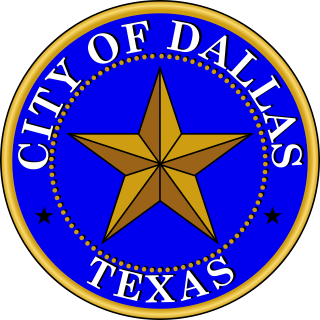
The Mayor of the City of Dallas is the head of the Dallas City Council. The current mayor is Eric Johnson, who has served one term since 2019 and is the 62nd mayor to serve the position. Dallas operates under a weak-mayor system, and a board-appointed city manager operates as the chief executive of the city.
Municipal boroughs were a type of local government district which existed in England and Wales between 1835 and 1974, in Northern Ireland from 1840 to 1973 and in the Republic of Ireland from 1840 to 2002. Broadly similar structures existed in Scotland from 1833 to 1975 with the reform of royal burghs and creation of police burghs.
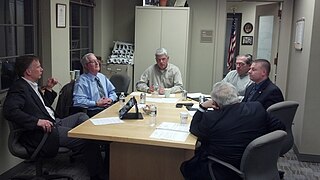
The board of selectmen or select board is commonly the executive arm of the government of New England towns in the United States. The board typically consists of three or five members, with or without staggered terms. Three is the most common number, historically. In some places, a first selectman is appointed to head the board, often by election.

The mayor of Boston is the head of the municipal government in Boston, Massachusetts. Boston has a mayor-council system of government. Boston's mayoral elections are non-partisan, and elect a mayor to a four-year term; there are no term limits. The mayor's office is in Boston City Hall, in Government Center.

The mayor of St. Louis is the chief executive officer of St. Louis's city government. The mayor has a duty to enforce city ordinances and the power to either approve or veto city ordinances passed by the board of aldermen.

Moses Kimball was a US politician and showman. Kimball was a close associate of P. T. Barnum, and public-spirited citizen of Boston, Massachusetts.
Massachusetts shares with the five other New England states a governmental structure known as the New England town. Only the southeastern third of the state has functioning county governments; in western, central, and northeastern Massachusetts, traditional county-level government was eliminated in the late 1990s. Generally speaking, there are four kinds of public school districts in Massachusetts: local schools, regional schools, vocational/technical schools, and charter schools.
The Lethbridge City Council is the legislative governing body that represents the citizens of Lethbridge, Alberta. Eight councillors and the mayor comprise the council. The mayor is the city's chief elected official and the city manager is its chief administrative officer. For the 2017–2021 term, the mayor is Chris Spearman and the councillors are Mark Campbell, Jeff Carlson, Jeffrey Coffman, Belinda Crowson, Blaine Hyggen, Joseph Mauro, Rob Miyashiro, and Ryan Parker.

John Phillips was an American politician, serving as the first mayor of Boston, Massachusetts from 1822 to 1823. He was the father of abolitionist Wendell Phillips.

The Boston City Council is the legislative branch of government for the city of Boston, Massachusetts. It is made up of 13 members: 9 district representatives and 4 at-large members. Councillors are elected to two-year terms and there is no limit on the number of terms an individual can serve. Boston uses a strong-mayor form of government in which the city council acts as a check against the power of the executive branch, the mayor. The Council is responsible for approving the city budget; monitoring, creating, and abolishing city agencies; making land use decisions; and approving, amending, or rejecting other legislative proposals.
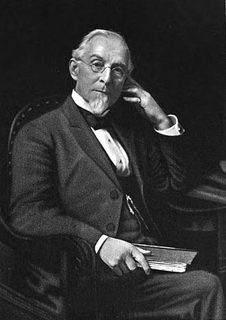
Thomas Norton Hart was an American manufacturer, businessman, and politician from Massachusetts who served as Mayor of Boston from 1889 to 1890 and from 1900 to 1902.

William Sarsfield McNary was a U.S. Representative from Massachusetts.

Martin Brimmer was an American businessman and politician, who served in the Massachusetts House of Representatives, in the Boston Board of Aldermen, and as the mayor of Boston, Massachusetts.
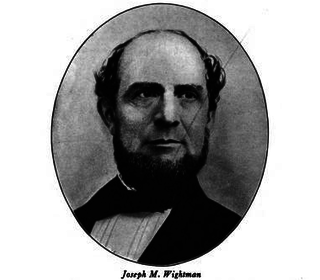
Joseph Milner Wightman was an American politician who, from 1861 to 1863, served as the seventeenth Mayor of Boston, Massachusetts.
Liverus Hull was a Massachusetts businessman and politician who served as a member of the Boards of Aldermen of Charlestown and Boston, and as the ninth mayor of Charlestown, Massachusetts.
The city government of Chelsea, Massachusetts was incorporated in 1857. From 1739 to 1857, Chelsea was incorporated as a town. From 1857 to 1991, the city's head of government was the mayor of Chelsea. The office of mayor ceased to exist after the city went into receivership. Since 1995, Chelsea has been led by a city manager.
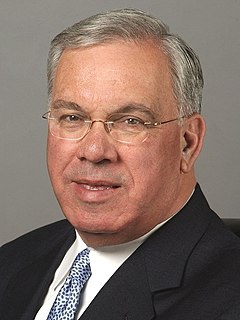
The Boston mayoral election of 2005 occurred on Tuesday, November 8, 2005, between incumbent mayor Thomas Menino and City Councilor Maura Hennigan. Menino was re-elected to a fourth term.
John J. Mullen was an American politician who served as Mayor of Everett, Massachusetts from 1917 to 1918.












